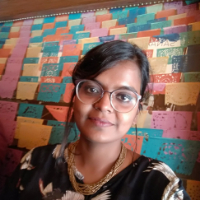Who's a Creative / Content Writer?
A content writer is someone who writes “content” for an online audience. This could be different types of websites, blogs, articles, press releases, and more. But content writers don’t just pull words out of their hats! They do a lot of research and gather the right information to help their audience. They identify who their audience is and what they like, and create content that will grab their attention. Curious to know how they do this? Browse through the Content Writer’s section to know more!
Does a career in creative writing fascinate you? Spend a day in the life of creative writer Sonia Mehta, to discover your future path!
What will you do?
Discover your Ideal future
Get expert guidance and mentorship towards your perfect fit.
Where will you work?
How do you get there?
What skills would you need?
How do you make it to the top ranks?
Intern
You’d work with different departments, handle simple tasks like researching or uploading content, and assist full-time writers with their projects.
Junior Writer
You’d work on marketing communication material and contribute to projects assigned by your senior writer.
Senior Writer
At this level, you would start taking on projects, create a detailed plan and framework, crack the main communication and assign smaller tasks to junior writers. Around this time, you may also decide to focus on editing and choose to specialise as an editor, or take up content planning and strategy, and work towards becoming a Content Strategist. If you’re interested in the marketing aspect of content, you could also look at becoming a Content Marketer.
Associate Group Head
You would handle multiple projects at this level. Your job involves cracking the marketing strategy and implementation plan for the content, and assigning different aspects to the relevant team members. You will also manage a team of writers at this level.
Group Head/Director
You’re the one who “pitches” to clients, which means you will create the first framework or idea that will be sold to the client in order to bag the project. You will also lead and manage all content-related projects in the organisation, build and train your own team of writers and delegate the right projects to the right team.
Pursuing your career locally VS abroad
If you’ve studied writing in India, you’ve understood the markets here and it would, therefore, make more sense to pursue the profession within the country. There’s a huge demand for good writers in just about every field, so you have plenty of job opportunities right here to try out!
Pursuing a BA or BMM in India would cost you anywhere from INR 2,00,000 to INR 20,00,000, depending on the university to choose. While a graduate degree is enough to land you a job, you might want to take up certificate or diploma courses after gaining a few years of experience to enhance your understanding of the field. Such courses can also be availed online; you don’t have to take a break from working to pursue them.
If you’re graduating in a writing course outside the country, you could always look for job opportunities in the country you’re studying it. It’s much harder to look for a job as a writer abroad with an Indian degree, mostly because countries like the US and the UK often look for native English-speaking writers (people with English as their first language/mother tongue)
A creative writing course abroad would cost you anywhere between INR 10,00,000 and INR 45,00,000, depending on the college you apply to. You could opt for a graduation programme in creative writing or even look at specialised certificate courses in content writing, digital writing or content marketing. There are several online certification courses that you could also pursue to enhance your knowledge of the subject.
You could work with international clients on projects, build a great network and reputation and use this to apply for jobs abroad. Pick a specialisation and carve your own niche within it – this could help you attract great job offers from all over the world!
How much would you get paid?
The exact amount of your salary will depend on where you work, the kind of writing you do, your skill-set, experience, etc. However, we can give you a fair idea of how much you would make.
What are your career options?
#CAREERREADY QUIZ
Think you know everything there is to know about this career?
Take the quiz to test your knowledge and find out how #CareerReady you are!
You got 1out of10right!
Discover your Ideal future
Get expert guidance and mentorship towards your perfect fit.













